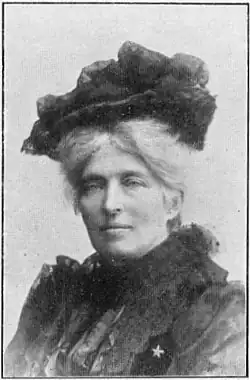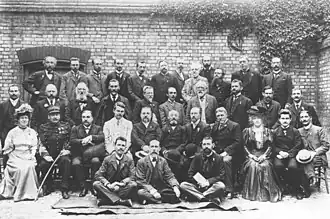Rosa Junck
Rosa Junck | |
|---|---|
 Junck in 1906 | |
| Born | Růžena Bílková 24 May 1850 |
| Died | 27 July 1929 (aged 79) Bordighera, Italy |
| Education | Prague Conservatory |
| Occupation(s) | Esperantist, educator, translator and opera singer |
| Employer | Provisional Theatre (Prague) |
Rosa Junck (born Růžena Bílková; 24 May 1850 – 27 July 1929) was a Czech Esperantist, educator, translator and opera singer.
Biography
Junck was born Růžena Bílková on 24 May 1850 in Tábor, Bohemia, Austrian Empire.[1]
Bílková graduated from the singing department of the Prague Conservatory, and in 1871 she began singing opera at the Provisional Theatre in Prague. After moving to perform in Innsbruck, Tyrol, she met and married a violinist named Junck.
After moving to Bordighera in Italy as a widow around 1890,[2] Junck learned the international auxiliary language Esperanto[3] and became a "pioneer of Esperanto in Italy."[4] She taught languages,[2][5] was a member of the Esperanto Lingva Komitato (Language Committee)[6] and became vice-president of the Bordighera Esperanto Club.[1]
With her colleague Clarence Bicknell,[2] Junck translated Italian works into Esperanto and vice versa, including Italian works by her friend Edmondo De Amicis[7] and L. L. Zamenhof's Esperanto exercise book Ekzercaro de la lingvo internacia Esperanto.

Junck attended several early World Esperanto Congresses, including the 1905 Congress in Boulogne-sur-Mer, France,[2] the 1906 Congress in Geneva, Switzerland,[8] and the 1907 Congress in Cambridge, England. Junck was also an international model for the standardised pronunciation of the language, particularly vowel sounds,[9][10] reciting poems at Esperanto events.[10][11] Zamenhof described her pronunciation as "exemplary."[12]
Junck died on 27 July 1929 in Bordighera, Italy.[1]
Publications
Translations into Esperanto
- La Floro De L' Pasinto (1906)[2] and Kverko kaj Floro (1906), by Edmondo De Amicis

Cover of Junck's Italian translation of L. L. Zamenhof's Esperanto exercise book Ekzercaro de la lingvo internacia Esperanto (1908)
Translations into Italian
- Ekzercaro de la lingvo internacia Esperanto (1908), by L. L. Zamenhof
- Fundamento de Esperanto (1907), as translation supervisor
References
- ^ a b c Chiriaïev, Ivan; Kökény, Lajos; Bleier, Vilmos (1933). Enciklopedio de Esperanto (in Esperanto). Vol. 1. Budapest: Literatura Mondo. pp. 270–271.
- ^ a b c d e "Celebrating Graham Avery's 10 years working on Clarence Bicknell". Clarence Bicknell. 19 March 2022. Retrieved 16 August 2025.
- ^ "Un secolo di traduzioni letterarie dall'italiano in esperanto". Centro Esperanto di Torino (in Italian). 11 January 2011. Retrieved 16 August 2025.
- ^ "Poděkování ženám v esperantském hnutí u příležitosti MDŽ". esperanto.cz (in Czech). Retrieved 16 August 2025.
- ^ L'Espérantiste: organe propagateur de la langue internationale "Esperanto" (in French). L'Espérantiste. 1899. p. 138.
- ^ a b "La Akademio havas naŭ novajn membrojn – Programo Mia Amiko". Didaktika Gramatiko de Esperanto (in Portuguese). Retrieved 16 August 2025.
- ^ Minnaja, Carlo. "CENTO ANNI DI ESPERANTO A PADOVA (1913-2013)" (PDF). Bitoteko.it (in Italian). p. 4.
- ^ Tonkin, Humphrey (2020). Memoru ĉi praulojn: Eseoj pri Esperanto-literaturo (in Esperanto). Mondial. p. 108. ISBN 978-1-59569-415-7.
- ^ Privat, Edmond (1927). Historio de la lingvo esperanto ...: La movado, 1900-1927 (in Esperanto). F. Hirt & sohn. p. 20.
- ^ a b Durrant, E. D. (1943). The Language Problem: Its History and Solution. Esperanto Publishing Company. p. 64.
- ^ The British Esperantist (in Esperanto). 1905. p. 175.
- ^ "Osobnosti A - O". esperanto.cz (in Czech). Retrieved 16 August 2025.